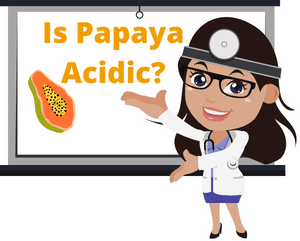Generally, fruits are considered wonderful for health. But, sometimes, the fruit can also have some negative attributes like being acidic.
When you eat or drink anything that has acidic properties, it may cause some problems.
Papaya is also and beneficial fruit with its sweet and soft textures. It is not only used for eating, but it also possesses many benefits as it is also used for medical purposes.
One of the appealing benefits of taking a bowl of papaya in your regular diet is that it works great to help you lose weight. There is not a single benefit of papaya, but here we have gathered a lot of things about this fruit that you should know about papaya.
No doubt papaya is a delicious fruit with many benefits, But as it possesses a sour taste, everyone asks whether it is acidic or not?

Is papaya Acidic?
Papaya has a pH that is lower than seven; that’s why it falls under the acidic classification. But the pH of papaya is between 5.5 and 5.9, which is very near to being neutral. So they are the least acidic fruit, and no doubt they are a perfect choice for everyone.
However, being acidic can also be beneficial as it can keep you safe from acidity because it contains papain enzymes.
This enzyme proves great for digestion.
Besides being acidic, papaya is considered an excellent fibre source and contains very low calories. Indigenous people eat papayas for medical purposes. This yellowish orange-coloured fruit can also help reduce weight and keep cholesterol in check. Let’s have a look at nutritionists’ facts and benefits 2of eating Papayas.
Nutrition present in papaya
One single papaya has approximately;
- 2-gram protein
- 30 grams carbohydrates including 5 grams of fibre and sugar of about 1 gram
- 1299 calories
Papayas are also a great source of providing;
- Magnesium
- Copper
- Fibre
- Vitamin A
- Pantothenic acid
- Folate
Other than these, papaya also possesses alpha and beta carotene, vitamin B, lutein and zeaxanthin, Calcium, Vitamin K and Vitamin E, potassium, lycopene and powerful antioxidants.
What are Benefits of Papaya?
Being least acidic in nature, they are extremely beneficial for health.
Papaya is an incredible plant with many uses. Its leaves are used to make medicines.
This yellowish-orange colour fruit is a storehouse of Vitamin A, C, and E and contains some nutrients. The presence of Vitamin A assures to boost up immune system by taking out all the toxins from the body.
Papaya contains 200% of your daily dose of Vitamin C, and also, there are potassium, antioxidants and fibre, which all helps to promote blood flow.
The increased blood circulation further helps reduce the body’s cholesterol level.
Nutrients present in papaya combined with antioxidant properties and helping to prevent heart diseases, which is the number one killer in the world.
Because of having antioxidant properties, they also help prevent cholesterol from oxidizing and clogging arteries.
Here is something wonderful about papayas that you may not know as they are rich in beta carotene. According to the research, taking a high amount of beta carotene can lower the risk of asthma and reduce the chances of developing certain types of cancer.
Besides these benefits, taking papayas on an empty stomach helps clean the digestive tract of toxins and smoothen the bowel movement because of digestive enzymes. Papaya is also famous for keeping away digestive disorders like bloating, upset stomach and constipation.

Some other benefits also include;
Hair health:
As papaya contains vitamin A, which helps moisturize hairs and results in a great fruit for hair growth. Vitamin A is also important for the growth of all bodily tissues.
Bone health:
Adequate consumption of Vitamin k is very important for the proper growth of bone; otherwise, there is a high risk of one fracture, as Vitamin K is essential in the absorption of Calcium and reduces urinary excretion of Calcium. However, taking papaya can also assure good bone health.
Healing of wounds and skin health:
Mashed papayas prove very beneficial for promoting wound healings and preventing infection of burned areas. Furthermore, beta carotene and lycopene, which is present in papaya, combined, works great for the skin. Papaya also helps protect the skin against free radical damage that causes wrinkles and other ageing signs.
Inflammation:
As papaya contains Choline, it helps our bodies in sleep, learning, muscles movement, and memory. Choline present in papaya also maintains the cell membrane structure, assists in the absorption of fats, and reduces chronic inflammation.
For a more complete overview take a lok at : Properties and Benefits of Papaya
What are other names for papaya?
“Papaya” is a very general name for calling this wonderful yellowish-orange fruit. Most people in the United States and Central America call this fruit with this name. You may wonder that there are also many names of this amazing fruit that the people around the world use:
- Pawpaw
- Lepaya
- Mamona
- Kepaya
- Tapaya
- Papaw
- Fruta Bomba
See also :
How are papayas effective as medicines?
Papaya is also a very effective medicine; some of the fastest cures related to papaya are the following;
- The papaya leaf is great for treating dengue fever.
- It is also best to treat high sugar levels and can also be used to treat the digestive system.
It also helps in the treatment off followings;
- Parasite infection
- Human papillomavirus infection (HPV)
- Cancer
- Stomach and intestine problems
When taking papayas for any treatment medication, then the dosage depends on several factors, including the user’s age, health, and other conditions. At present, there is not enough scientific information that can determine the proper range of papaya dosage.
However, some health providers believe that taking three doses of up to 1 ounce of papa leaf extract proves great for treating dengue fever.
Just keep in mind that taking natural products does not always prove safe, and dosage is important.
So be sure to follow the direction on the product label, and if you feel unsure about the proper dosage, you should consult a healthcare provider.
What is the best way to eat papaya?
Previously, papaya was exotic and rare fruit, but now you can enjoy it the most time of the year. The best way to eat papaya is when it is raw and ripe well.
After taking the riper papaya, remove its seeds and use a spoon to scoop out the fruit. There are many ways to add papayas to regular recipes.
- Papaya can be used in tropical salads with pineapple and mangos.
- You can also add some slices of frozen papayas to the smoothies.
- You can make fresh salsa with papayas, jalapeno, red pepper, mango and chipotle pepper.
Some people do not like the off-putting odour of ripe papayas, but this smell can be minimized by mixing lime juice into fruit after cutting it.
How can papaya seeds be used?
Some people throw papaya seeds after cutting the fruit, but before throwing, you should know that these seeds are edible and are perfect for eating.
The seeds in papaya have a crunchy texture with a slightly peppery flavour and proved perfect seasoning doe many dishes. So, do not throw the seeds after cutting the papaya and just save it for later use.
After taking out the seeds, use a strainer and rinse them with water, and rub the seeds to remove any residues with your hands. After washing, place the seeds on a towel to dry them. When dried, you can grind them to make a powder and then enjoy it on any food.
Is there any side effect of taking papayas?
Even though papaya is a very healthy fruit with numerous benefits, a few side effects are also associated that may occur in some people.
It is a fact that unripe papaya contains a high amount of latex, but this amount decreases as the fruit ripens.
It is also recommended to avoid taking papaya during pregnancy because latex present in papaya causes uterine contraction and early labour.
If you are allergic to taking latex, then taking papaya can also be allergic for you. The signs of latex allergy include; itching, stuffy nose, hives, wheezing and chest tightness. When there is a severe latex allergy, taking papaya can cause extreme breathing difficulty.
As papaya is a source of fibre and proves good for digestion, eating too much papaya can cause diarrhea and disturb the stomach. When you face any stomach problem because of taking much papaya, you should immediately consult a healthcare provider and minimize the use of papaya from your daily diet.
As Papayas lower the blood sugar, people taking medicines to lower their blood sugar should pay close attention to their blood sugar as there may be a need to adjust the medication.
Fermented papaya can lower blood sugar. So this form of papaya can affect your blood sugar during and after the surgery. If you are taking papaya, stop two weeks before surgery.
There is also some evidence that papaya seeds may function as spermicidal and reduce sperm motility. That’s why you should avoid taking the seeds of papaya when you decide to increase your family.
